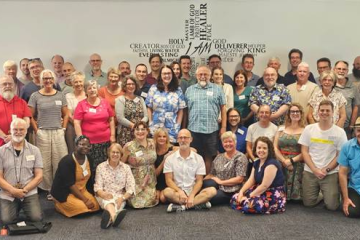Every now and then, when I go on a long walk or a hike – probably because I am not the fittest person in the world – it is good to stop, catch my breath and look back at how far I’ve come, and the same is true of this series on Field Notes for the Wilderness. This is a good point to stop and look back at what we have explored, at each of the sermons on spiritual practices that might help us on this journey.
We have talked about cultivating hope (or tree ferns), learning to lament, being ordinary mystics, going slowly on purpose, reclaiming repentance and, last week, learning to love the world again. (It was interesting how often ‘being open to the world’ came up at the Open Baptists Gathering last weekend. The speaker, Steve Frost, talked about “making space for difference, leaving space for growth” – how in any encounter with the world, with another person – he might be the one needing to grow. It was a really good weekend. I’d encourage you to go to Sunday to Sunday or to Tuggeranong Baptist’s website and check out the links!) And today we’re looking at ‘nurturing our own belonging’ or is it a good idea to be part of the church?
The actual word ‘church’ comes from the Greek word, kyriakon, meaning ‘belonging to a lord’, and appears twice in the New Testament, as the ‘The Lord’s Supper’ (1 Cor 11:20) and ‘the Lord’s day’ (Rev 1:10), and over time also came to mean the place where Christians gathered. But the word used 114 times in the New Testament for church is a word for a group of people. It is ekklesia, from the preposition, ek, ‘out of’, and the verb kaleo, ‘called’. The people who are called out by God to embody a different way of being in the world. As Paul says in our passage today, verses 1-3; “lead a life worthy of the calling to which you have been called, with all humility and gentleness, with patience, bearing with one another in love, making every effort to maintain the unity of the Spirit in the bond of peace.”
But we are well aware that the church has not lived up to this different way of being. We are well aware that the church has been and continues to be blighted by abuse and the scandal of church leaders who cover up this abuse. We know many people point to the wars waged in the name of religion as a blocker to belief. (Though there is considerable debate about the role of religion in human conflict. According to the Encyclopedia of Wars, out of all 1,763 recorded historical conflicts, 123, or 6.98%, had religion as their primary cause.) People also view the church as hypocritical and judgmental and failing to respond adequately to human suffering. According to McCrindle Research these are the top five issues that most discourage people, people who are open to exploring faith, from exploring Christianity.
And then there are people’s personal experiences. In this chapter Sarah Bessey mentions how, in a previous book, she had spoken glowingly about belonging to a particular church, but then, she says, “Our family affirmed and welcomed LGBTQ+ believers into the life of Christ as embodied in life and ministry, and because of that, a line was drawn and we stood on the other side of it. I don’t regret this in the slightest,” she says, “I’d choose it again and sooner and probably better knowing what I know now. It was awkward, intense, complicated, and human…. [but through that experience] a place of belonging became a place of alienation too.”
None of us can relate to that, can we? That feeling of going through something that is awkward, intense, complicated, and human? That feeling of having our hearts broken because a place that was a place of belonging is now a place of alienation too?
We are well aware of how people’s relationships with church can be complicated.
In his novel, Eminence, the author Morris West tells the story of Luca Rossini, a Cardinal in the Roman Catholic Church, who now serves in the Vatican, but lives in the shadow of what took place in Argentina in the 1970’s; his own terrible experiences and his sense of betrayal by the silence of many church leaders.
In the novel, he is interviewed by a journalist who begins by asking, “Let’s deal with the big questions first. What’s wrong with the Church?”
And Luca’s replies, “The same things that have been wrong with it for two thousand years – people! Men and women and children, too, who make up the family of believers. This isn’t a community of the pure and the perfect. They’re good, bad and indifferent. They’re ambitious, greedy, fearful, lustful, a rabble of pilgrims held together by faith and hope – and the difficult experience of love.”
That is who we are as the church- a rabble of pilgrims held together by faith and hope – and the difficult experience of love.
And that is who Paul writes to in our reading from Ephesians today. He is not writing to a church that has got it all together; whose members have mastered how to be humble and gentle and patient with each other, who have an unblemished record of maintaining the unity of the Spirit in the bond of peace, who are all exercising their gifts in perfect complementarity, who are in every situation bearing with one another in love, speaking the truth in love and building the church up in love.
No. He is writing to ordinary people, ordinary people who are part of the church, ordinary people who are part of that rabble of pilgrims, ordinary people like us.
Which is why he writes this, and why he begs them to “live a life worthy of the calling to which you have been called” and why he reminds them of what he has given up, that he is a prisoner in the Lord, because, he is saying, being part of this risky endeavour, a rabble of pilgrims held together by faith and hope and the difficult experience of love, is worth it.
Because the church is, he writes back in chapter 3, where the grace of God, the boundless riches of Christ, are revealed. Verse 10, “through the church the wisdom of God in its rich variety (its boundlessness) might now be made known to the rulers and authorities in the heavenly places.” The church tells the whole world that God loves that God loves it!
And the church is a place where we, as a part of God’s world ourselves, also discover and learn God’s love! Verse 18, “I pray that you may have the power to comprehend, with all the saints, what is the breadth and length and height and depth, and to know the love of Christ that surpasses knowledge, so that you may be filled with all the fullness of God.”
Grace is given to each of us, chapter 4, verse 7 tells us, according to the measure of Christ’s gift (that’s a pretty broad measure), so we can embody grace together. As author and podcaster Katherine May says, quoted by Bessey, “More and more, I crave
being part of a congregation, a group of people with whom I can gather to reflect and contemplate, to hear the ways that others have solved this puzzling problem of existence. Most of all I want them to hold me to count, to keep on track, to urge me towards being good. Holding spiritual beliefs on my own is lonely. I want to be part of a group that makes me return to the ideas that bewilder and challenge me.”
We need community, but we know that being part of a community, genuinely opening up our lives to others, going on a journey together can be risky. “It is always going to be a risk,” Bessey writes, “Community is a risk; friendship and love are risks.”
Aron and I celebrated thirty years of taking a risk, thirty years of marriage, this week and I was reminded of how, before our wedding, Aron went on a solo camping trip in the Victorian bush to prepare himself for the challenge ahead. (Getting married to me was obviously daunting!) He even upped the ante by going on a nighttime hike during which he got lost, and sometime later managed to stumble across his campsite again. Fortunately, emergency services did not have to be called!
But I think that experience taught him a. that nothing could completely prepare him for what marriage would bring; but b. while there would be ups and downs, somehow, he/we would get through them. Bessey writes regarding the church, “For me, it has helped to surrender many of my expectations for the ideals, make peace with the realities, and simply carve out a space between them both for possibility.”
Because beautiful possibilities occur as we let go of our ideals of how others (or how we) are always going to behave and allow our brokenness and God’s forgiveness to meet. As we move through the childhood stage, as Paul puts it, verse 14, of being “blown about by every wind of doctrine, by people’s trickery” and craftiness and deceit (and by our own!) and as we, verse 15; “speaking the truth in love, grow up in every way into him who is the head, into Christ.”
“Belonging,” Dianna Butler Bass writes, “is the risk to move beyond the world we know, to venture out on pilgrimage, to accept exile. And it is the risk of being with companions on that journey; God, a spouse, friends, children, mentors, teachers, people who came from the same place we did, people who came from entirely different places, saints and sinners of all sorts…”
There is one final practical piece of advice in this chapter on nurturing our belonging from professor, Baptist pastor and author David Gushee. He writes:
My counsel to my fellow post-evangelicals is simply this:… Seek out a flesh and blood local community of covenanted believers who are seriously committed to following Jesus and seeking his kingdom together, who reflect and seek Christian unity, holiness, catholicity (for all, including LGBTQ+ people) and apostolicity [In other words openness to heart of God and faithfulness to following Jesus.] Seek out a community where you can experience the love of God and people. Christ alive and active on the earth, the loving presence of God’s Spirit, people doing kingdom work, support for your journey, and serious nourishment through Scripture, worship and sacrament. Look for a place where you can make a covenant commitment to real people for the long term. Then do that.
That is what we here at CBC as a rabble of pilgrims held together by faith and hope – and the difficult experience of love – are seeking to do together. We acknowledge that we are still on the way, but we are thankful that we are still on the way.
Let’s sing, “Brother, sister, let me serve you…” as our commitment to nurturing our belonging and being a place of grace that nurtures the belonging of others.


